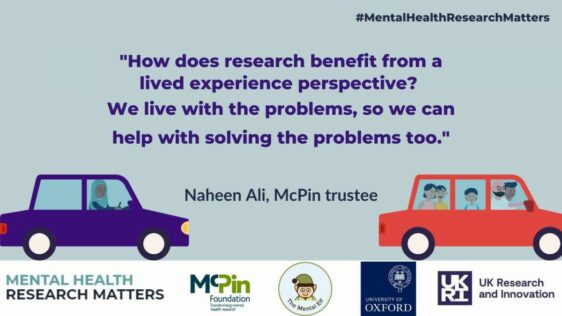McPin trustee, Naheen Ali, writes about the value of bringing your lived experience to mental health research.

Having been a lived experience researcher, as well as taken part in mental health research as an advisor in various research for different charities, universities, organisations, and of course McPin, I can say that we need to understand research from the point of view of those with lived experience.
There are so many benefits here.
A researcher’s perspective
As a researcher, I found myself working on projects related to improving mental health for those using local mental health services.
Having a mental health condition, as well as understanding some of the mental health issues in society, helps with setting research priorities and creating a research question to work on. Because of this experience, we are able to see the gaps in the community, where there may be a missing service or one we can improve on at different stages of a person’s mental health journey.
We are fuelled by our empathy, compassion, motivation and desire through our own suffering or passion to improve mental health for ourselves, as well as our loved ones. This could be at a local or national level, through our community, society, or health services. After all, we use mental health services all the time, so we understand what we need and what is missing. We see the blind spots that others may miss, that other researchers can learn from, with us. We can also learn from them.
A society such as the UK with many inequalities to address, and a variety of groups who may have mental health needs to consider will include those from diverse cultural and ethnic groups, a range of socio-economic backgrounds. These groups might include the unhoused, and children and young people in care.
We cannot thrive within a ‘one size fits all’ approach, so let’s start listening about the complexities of mental health so we can cater for these different groups in society.
We are multidimensional, multi-faceted, intersectional and diverse with different experiences based on the communities we live in, and the systems and services we have to address our mental health needs, as well as the people and relationships we have around us.
We cannot thrive within a ‘one size fits all’ approach, so let’s start listening about the complexities of mental health so we can cater for these different groups in society, to help reduce some of the inequalities we experience, and to create a more inclusive society.
As researchers with lived experience we also have awareness of what needs to change and who needs to make those changes. Perhaps the change needs to come from local charities, or primary and secondary care.
Maybe the change must happen within community services or in employment. Or by addressing social and structural inequalities, social policies and in improving treatment such as therapeutic interventions.
We are able to carry out research with the empathy, compassion and some understanding of the participants we interview. Whether this is on their own or through focus groups. This makes the participants more at ease being interviewed by us. They know we understand how their mental health may affect them.
As researchers, we also learn to widen our understanding with lived experience whilst conducting research to remove any preconceived notions or assumptions of health staff, community workers or any other people who may not have lived experience. So we become aware of challenges and the realities of practically creating and implementing positive mental health change.
Our researchers without lived experience also get to see how we look at the world. When this is done together with those with lived experience, it is a process of collaboration, deep thinking, reflection and change. We can all learn and grow together.
By actively listening and fully engaging with each other, and respecting each other and our different perspectives, we have the focus for producing meaningful change for people living with mental health, in the best way possible.
The process is a collaborative one between us and the researcher, where the researcher is learning and being curious with us. It is more than just academia – we are people with real life experiences.
Research involvement: A lived experience advisor perspective
Being a lived experience advisor in mental health research is a completely empowering process. To be part of research which really looks at improving services, such as mental health peer support, or how homelessness or poverty may be related to mental health, or even how mental health data is collected in health services to improve services in future, is something special.
The process is a collaborative one between us and the researcher, where the researcher is learning and being curious with us. It is more than just academia – we are people with real life experiences, and the reality in practice is so important to learn from.
Meeting other people with lived experience is also refreshing and supportive, knowing you are not alone. You may talk about an experience you’ve not been able to disclose about your mental health experiences to anyone else before. Or you could learn about how others experience mental health in different areas of the country.
You get to join the dots and see how mental health services work in different areas and how different issues are approached.
Is research the new activism? The new campaigning? Could lived-experience researchers be the new change-makers in society who could impact education, employment, community and health services? I hope the answer is ‘yes’.
People with lived experience feel their voices are not being listened to currently. Our input in creating and implementing mental health interventions and services across the country could be invaluable.
With having lived experience as mental health researchers, as well as taking part in mental health research, we can put solid, real-life evidence behind well throughout solutions.
We live with the problems, so we can help with solving the problems too. The research also becomes of higher quality as a trusted source with a lived experience narrative and is based on real life examples. We help change research practices to consider the people’s lives, those lives we want to improve at all times, and will not stop until good mental health is achieved for all.
The Mental Health Research Matters campaign is sparking a conversation about why mental health research matters, what good mental health research looks like and how we can all make a difference. Tell us why #MentalHealthResearchMatters on Twitter, using the hashtag and tagging in @McPinFoundation.
In November the campaign is running free weekly webinars on mental health research. Book your place now.
